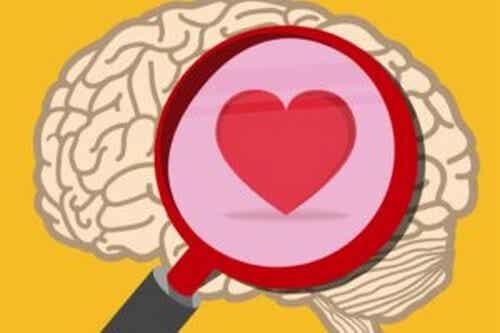Accepting one's emotions is often a challenge, especially when we despise or avoid our inner dialogue with a wide variety of technological resources.

Last update: October 09, 2021
Some emotions aren't easy to manage, while others aren't easy to accept. For example, loving a person who has hurt us, feeling resentful towards those who care for us, some sadness after reaching a goal, etc. Learning to accept emotions is one of the main goals of psychotherapy.
A study conducted by the universities of Virginia and Harvard reveals that for many people it is impossible to be alone with their thoughts. Between a third and a half of the participants actually used their mobile phones or listened to music during.
Within the framework of Hayes' theory of acceptance and commitment therapy, accepting emotions takes on greater importance. Experiential avoidance, as it is called by this approach, involves the total rejection of unpleasant feelings, thoughts or emotions.
We generally try by all means to avoid or escape from the adverse emotional experience. Each time we deny or reject an emotion, however, the discomfort increases.
The society of well-being and the inability to accept emotions
If we think about our daily life, we will notice that we devote a lot of resources to avoiding stimuli that are deemed annoying, boring or irritating.
In the past, we had to wait days to develop to be able to see a photograph; you had to manage the uncertainty of not knowing if the photo was good or not, if it was sharp or blurry. It was like that and there was no alternative.
Today we take a photo and we have the opportunity to see and analyze it immediately. Without waiting, without uncertainty: here and now. If we don't like it, we delete it and take another one.
It is all based on our well-being. This, of course, is just one example of the many that we can find in a life based on immediacy and comfort.
Perhaps you think that the example of the photo is excessive, that today life confronts us with greater problems than before. This is partly true.
However, it is important learn to be flexible and to tolerate everyday situations, as they are valuable learning opportunities.
Opportunities to learn how to manage emotions
Spend a whole day without a mobile
Would you accept the challenge? Would you be able to overcome it? If the answer is no, you have some degree of cell phone addiction. We need to constant stimuli as we love comfort and enjoy low tolerance to boredom.
To start training in this sense, a good opportunity to learn to accept emotions could be to turn off the phone for a whole day and dedicate time to something else. We may be surprised at how pleasant the feeling of wasting time is.
Wait for the pedestrian traffic light to turn green
Another opportunity to learn to accept emotions. We get bored on the sidewalk waiting for the light to turn green, so we check if any cars arrive so we can go red.
If we fail to cross, we begin to think: “How long is this traffic light! When I arrive it is always red! While I'm waiting, we might as well take my cell phone… ".
Waiting for the traffic light to turn green, crossing calmly, slowly and feeling present, standing, alive, contemplating the city, is priceless.
Take the longest line to accept emotions
Opting for the longest line at the supermarket or checkout is a good way to accept boredom or discomfort. From this perspective we will be able to better analyze our inner dialogue. Thoughts like: “How slow this cashier is! Every time I get in line, there is a problem! ”.
When you feel this irritating impatience, try to change it: “I'm fine here, I can take the opportunity to look around and not think about anything. Just wait calmly ".
Do one thing at a time
When you shower, just take a shower. When you have breakfast, don't look at your cell phone. In short, try to dedicate yourself to one activity at a time.
Doing multiple activities at the same time is not emotionally or cognitively healthy or productivity. Multitasking increases stress.
Don't answer right away
Try not to reply to WhatsApp messages immediately, postpone a bit and slow down the momentum. It's a good way to learn how to handle other, more intense impulses. You can count 15 or 20 minutes and then respond, repressing the discomfort of not being quick.
A day without television
Like the cell phone, television also acts as a veil for our emotions. We propose not to fill the empty moments by turning on the television.
Take breaks between cocktails
In many cases, alcohol is a short-term resource that calms everyday stress and boredom, ultimately helping you get better. Nonetheless, its effects are momentary, like a trap.
Alcohol can gain ground and become our worst enemy. So beware! It wouldn't hurt to start delaying the next drink by holding back the urge to drink, feeling the urge as another emotion.
This principle is also applicable to other addictive elements, such as cigarettes, anxiolytics, etc.
Enjoying the traffic to learn to accept emotions
If you find yourself in a traffic jam, enjoy! Instead of cursing left and right, why not take advantage of the moment to listen to music, look at the sky or observe the drivers around?
Because it is important to accept emotions
Learning to accept emotions means do not live anchored to the culture of immediacy. Technology, of course, stimulates this dynamic, as we have already seen with photography or social networks.
Today we want everything now and we believe we can not stand anything else. But it is only a belief. The human being is capable of being very flexible and tolerant if he decides it, because he was already so in the past.
Remember those women who didn't have a washing machine and had to wash clothes by hand. Instead of complaining, they enjoyed the moment: they would meet friends and neighbors, wash their clothes together, have a chat and take advantage of a common space to rejoice.
We can cite many examples similar to this. The culture of the present, in many cases, only trains our intolerance. It would be useful to ask oneself about the actual desire to be part of it and how to remedy it.
In this article we have provided some examples, but there are many other daily opportunities to learn to accept emotions. Find the ones that work best for you and take it as a challenge to start being more flexible.

























